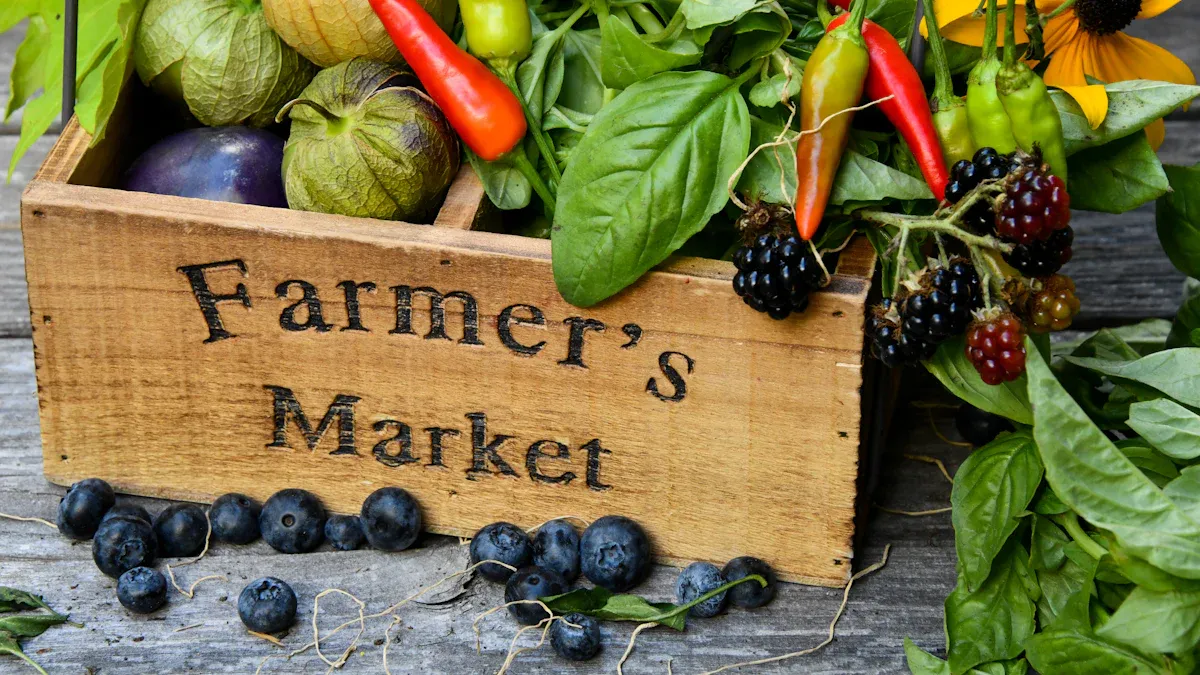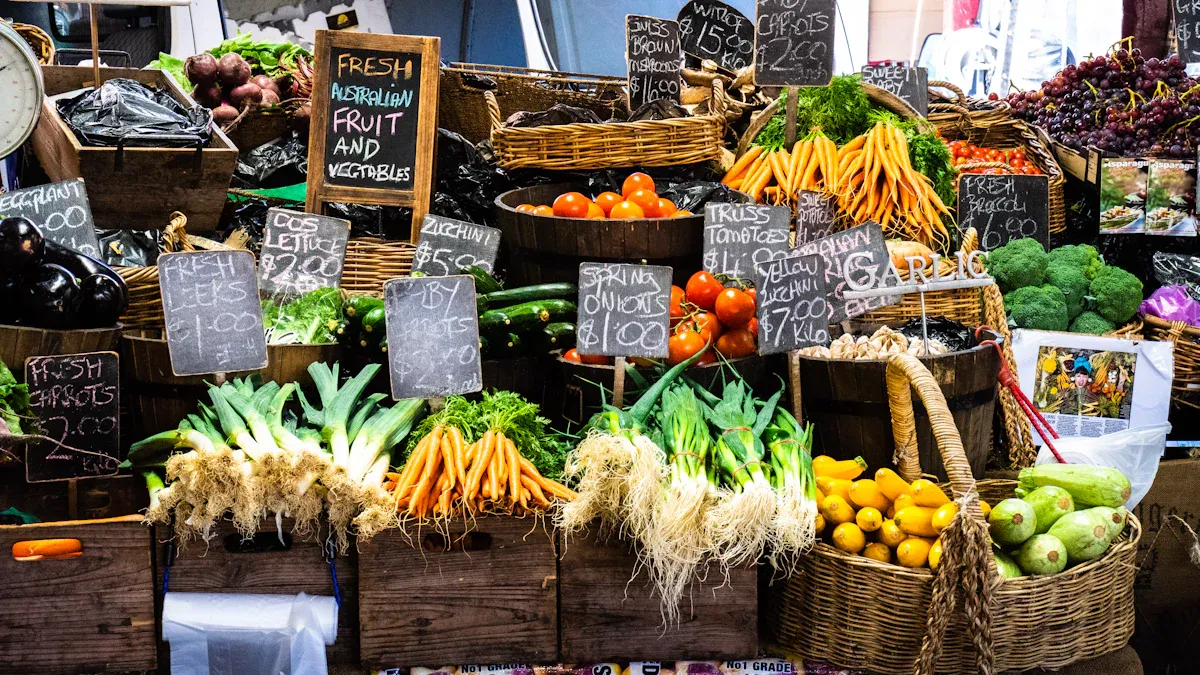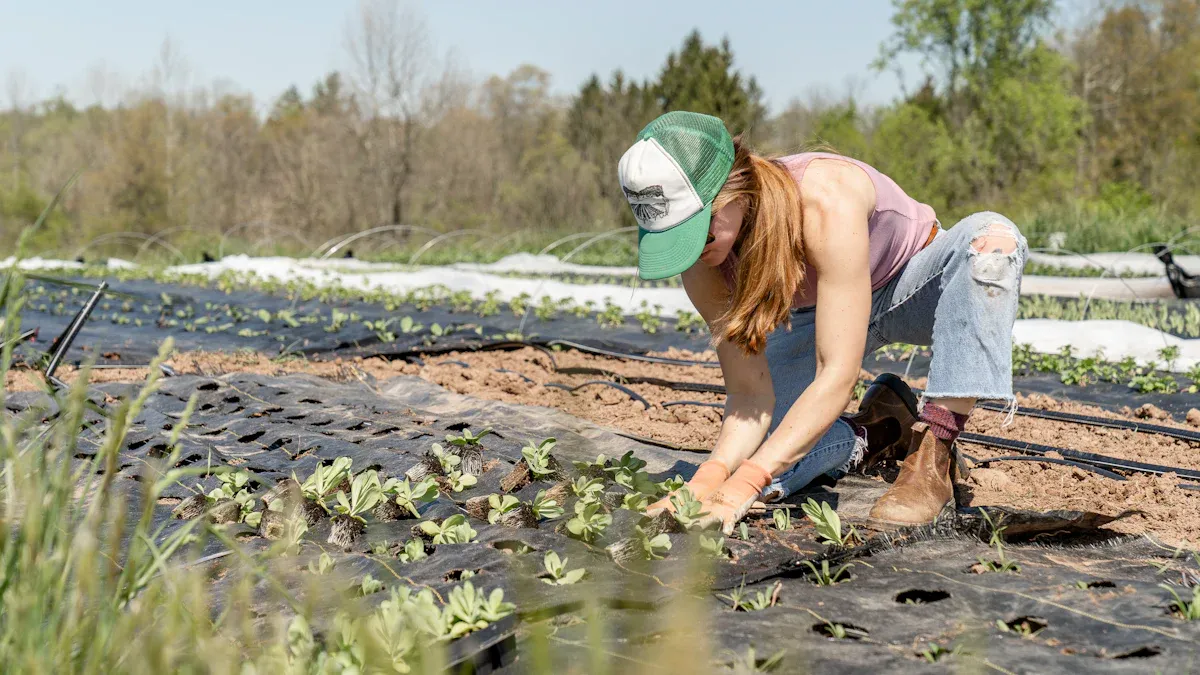7 Essential Questions to Ask Farmers for Better Food Choices
- Healthy Living
- Posted 11 months ago
Do you ever wonder where your food really comes from? Talking to your local farmer can give you surprising answers. By asking the right questions to farmers, you can make better choices for your health and the planet. These important questions to ask farmers help you understand farming methods, animal care, and sustainability. Choosing a farmer who values transparency ensures you get fresh, ethical, and high-quality food. Plus, supporting local farmers strengthens your community and builds trust.
Key Takeaways
Asking farmers how they grow food helps you learn about farming and choose healthier options.
Ask about their methods to support eco-friendly farming that keeps the planet safe and food good.
Find out how animals are treated to make kind choices that care for their well-being.
How is my food grown or raised?

Why this question matters
When you ask farmers how your food is grown or raised, you’re taking the first step toward understanding what you’re putting on your plate. This question helps you learn about farming methods, whether the food is grown conventionally, organically, or through sustainable practices. For example, organic farming avoids synthetic pesticides and fertilizers, while sustainable farming focuses on preserving the environment for future generations.
Knowing how your food is grown also impacts your health. Did you know that 99.5% of fruits and vegetables tested had pesticide residue levels below EPA standards? Even so, many shoppers worry about safety when buying conventional produce. Asking questions to your farmer can help you make informed choices that align with your values and health goals.
The impact of farming methods
Farming methods don’t just affect your food—they impact the planet too. Practices like crop rotation and organic farming can reduce greenhouse gas emissions by improving soil health. In fact, studies show that better farming techniques could cut at least 31 million tons of CO2 emissions annually.
Farmers who adopt sustainable methods also contribute to reducing hunger and poverty. Between 1970 and 1995, improved farming practices doubled rice yields, reduced poverty by half, and increased caloric intake by 35%. These numbers highlight how important questions about farming methods are—not just for your food but for global well-being.
By asking questions to ask your farmer, you’re not just buying food. You’re supporting practices that benefit your health, the environment, and communities worldwide.
What farming practices are used?
Sustainable farming techniques
When you ask farmers about their farming practices, you’ll often hear about sustainable methods. These techniques aim to protect the environment while producing healthy food. For example, crop rotation helps maintain soil fertility and reduces the need for chemical fertilizers. Natural pest management, like introducing beneficial insects, can replace harmful pesticides.
Sustainable farming also focuses on reducing waste and conserving resources. Programs like the Farm Sustainability Assessment (FSA) guide farmers in adopting eco-friendly practices. Here’s a quick look at what the FSA covers:
Aspect | Details |
|---|---|
Program Name | Farm Sustainability Assessment (FSA) |
Developed By | Sustainable Agriculture Initiative (SAI) |
Focus Areas | People, Planet, Profit |
Applicability | Customizable for all agricultural crops globally |
Benefits | Improved product sustainability, enhanced economic prospects, compliance with social and environmental criteria |
By supporting farmers who use these methods, you’re helping to protect the planet and ensure future generations have access to nutritious food.
Comparing traditional and modern practices
Traditional farming often relies on monoculture, where one crop is grown repeatedly. This can harm the environment by depleting soil nutrients and increasing the need for chemical inputs. In contrast, modern sustainable practices focus on preserving biodiversity and improving soil health.
Here are some key differences:
Traditional farming can lead to deforestation and water pollution. Sustainable farming works to reduce these impacts.
Sustainable techniques, like crop rotation and natural pest control, replace harmful chemicals.
Modern methods aim to lower greenhouse gas emissions and protect ecosystems.
By asking questions to ask your farmer, you can learn whether they use sustainable practices or stick to traditional methods. These conversations help you make informed choices that align with your values.
Are pesticides or chemicals used?
Why it’s important to ask
When you’re buying fresh produce, it’s natural to wonder if pesticides or chemicals were used. These substances help protect crops from pests and diseases, but they can also leave residues on your food. Asking farmers about their use of pesticides gives you a clearer picture of what you’re eating. Some farmers use synthetic chemicals, while others rely on natural alternatives like neem oil or companion planting.
Pesticide use has grown significantly over the years. In 2022, global pesticide use reached 3.7 million tons, a 4% increase from the previous year. Since 1990, pesticide use per cropland area has nearly doubled. Asia, for example, exported $21.7 billion worth of pesticides in 2022. These numbers highlight why it’s essential to ask questions to your farmer about their practices.
How to make informed choices
Understanding pesticide use helps you make better food choices. Some farmers follow strict guidelines to minimize chemical use, while others adopt organic methods that avoid synthetic pesticides altogether. If you’re concerned about residues, ask if the farm uses integrated pest management (IPM). This approach combines natural pest control with minimal chemical use.
Here’s a quick look at pesticide trends:
Year | Total Pesticides Use (Mt) | Change from Previous Year | Change Over Decade | Change Since 1990 |
|---|---|---|---|---|
2022 | 3.70 | +4% | +13% | Doubled |
By asking questions to ask farmers, you can learn how they balance crop protection with environmental care. These conversations help you support practices that align with your values and health priorities.
How are animals treated on the farm?

Why animal welfare matters
When you ask farmers about how animals are treated, you’re diving into one of the most important aspects of ethical farming. Animal welfare isn’t just about kindness—it’s about ensuring animals live healthy, stress-free lives. Across 14 U.S. states, policies have been introduced to improve conditions for breeding sows, veal calves, and laying hens. These standards aim to reduce overcrowding, provide better shelter, and ensure access to clean food and water.
Animal treatment also influences the quality of the food you eat. Stress and poor living conditions can affect the health of animals, which in turn impacts the meat, eggs, or dairy they produce. By asking questions to ask farmers, you can learn whether they prioritize humane practices or follow outdated methods.
What consumers think about animal welfare
Surveys reveal that public support for farm animal welfare (FAW) policies is growing. In the U.S., preferences for stricter regulations vary by dietary habits, age, and location. Urban residents and younger generations tend to favor stronger welfare standards, while rural communities often lean toward traditional practices.
In Belgium, studies show consumers are willing to pay more for meat from farms with better animal welfare. Hypothetical scenarios used in research highlight how people value humane treatment, especially for beef, pork, and chicken. These findings suggest that consumer attitudes are shifting toward supporting ethical farming.
By asking farmers about their animal care practices, you’re not just making better food choices—you’re encouraging a shift toward more humane and sustainable farming methods.
Is the farm certified organic or sustainable?
Why certifications matter
When you ask if a farm is certified organic or sustainable, you’re uncovering a lot about its practices. Certifications act as a seal of trust, showing that the farm meets specific standards for health, ethics, and environmental care. For example, the USDA National Organic Program ensures that organic farms avoid synthetic pesticides and GMOs. Similarly, the Rainforest Alliance certification focuses on protecting ecosystems and conserving water.
Here’s a quick look at some well-known certification programs:
Certification Program | Description |
|---|---|
USDA National Organic Program | Enforces national standards for organic products and certifies compliance. |
Rainforest Alliance | Ensures ecosystem protection, water conservation, and positive community relationships. |
Certifies Biodynamic farms with stricter ecological standards. | |
SARE | Supports sustainable practices through grants and education for farmers. |
Certifications like these help you identify farms that prioritize sustainability and ethical practices. By choosing certified products, you’re supporting farmers who care about the planet and your health.
Comparing certified and non-certified farms
Certified farms often follow stricter guidelines than non-certified ones. A study by Clark and Tilman (2017) compared organic and conventional farming systems. It found that organic farms generally use less energy, except for certain crops like vegetables. However, they may require more land to produce the same amount of food. Organic farms also tend to rely on manure, which can lead to nutrient runoff and environmental issues.
Non-certified farms might not follow these strict standards, but that doesn’t mean they’re always harmful. Some small-scale farmers use sustainable methods without seeking certification due to the high costs involved. Asking about their practices can help you understand their approach.
By learning about certifications and farming methods, you can make informed choices that align with your values. Whether it’s organic, sustainable, or uncertified, the key is to support farms that prioritize quality and care.
How does the farm support biodiversity?
Why biodiversity matters on farms
Biodiversity on farms isn’t just about pretty landscapes. It plays a big role in keeping ecosystems healthy and productive. When farms support biodiversity, they create habitats for wildlife, improve soil health, and even boost crop yields. You might not realize it, but farms with diverse plants and animals are better at fighting pests and diseases naturally.
Some farming practices are especially good for biodiversity. For example:
Natural buffer areas, like hedgerows or grassy strips, provide homes for birds, insects, and small mammals.
Crop rotation and mixed planting help maintain soil nutrients and reduce the need for chemical fertilizers.
Sustainable grazing practices protect grasslands and prevent overgrazing.
A review of 331 studies found that alternative farming methods, like these, generally improve biodiversity compared to intensive farming. Farms with natural buffer zones, in particular, showed a big increase in aboveground biodiversity.
Regional differences in biodiversity outcomes
Not all farms are the same when it comes to biodiversity. The type of farming system and the region can make a big difference. Here’s a quick look at how different systems compare:
Farming System Type | Biodiversity Outcomes | Regions Lacking Data |
|---|---|---|
Integrated crop-fish | Northern Africa | |
Crop-livestock | Moderate biodiversity | Southwest Asia |
Root and tuber crops | Low biodiversity | Eastern Europe |
Farms that combine crops and livestock or integrate fish farming tend to have higher biodiversity. In places like Malawi, Indonesia, and Germany, diversified farming has also improved food security. Plus, these methods rarely hurt crop yields.
By asking farmers about their biodiversity practices, you can support farms that care for the environment while producing healthy food. It’s a win-win for you and the planet!
Can I visit the farm or learn more about it?
Why visiting farms matters
Have you ever thought about visiting the farm where your food comes from? It’s one of the best ways to see how your food is grown or raised. A farm visit lets you ask questions, observe farming practices, and even meet the farmers themselves. This kind of firsthand experience builds trust and helps you make informed choices about what you eat.
Farm visits also give you a chance to verify sustainable practices. For example, studies show that comparing conventional farms with climate-smart ones can reveal big differences in sustainability. Here’s a quick look at how researchers evaluate farming methods:
Study Approach | Description |
|---|---|
Space-for-time substitution | Measures the impact of management changes by comparing different farm types. |
Paired fields | Evaluates sustainability by comparing practices on neighboring farms. |
Commercial farms vs. long-term trials | Assesses how experimental methods work in real-world farming. |
Diversity of commercial farm management | Highlights variations in sustainability across farms in a region. |
By visiting farms, you can see these practices in action and understand how they affect the environment and food quality.
The educational benefits of farm visits
Farm visits aren’t just about seeing where your food comes from—they’re also a great way to learn. When you interact with farmers, you gain a deeper understanding of local food systems and sustainable agriculture. Research shows that these visits can inspire you to make more eco-friendly choices.
For example, surveys from the High Country Farm Tour revealed that visitors felt more connected to their community after learning about sustainable practices. They also became more aware of how their food choices impact the environment. This kind of hands-on education helps you build stronger relationships with local farmers and encourages you to support ethical farming.
So, the next time you’re curious about your food, why not ask if you can visit the farm? It’s a fun and educational way to connect with your food and the people who grow it.
Asking farmers these seven questions can transform how you think about food. It helps you make choices that are healthier, more ethical, and better for the planet. When you engage with farmers, you support sustainable practices and strengthen your local community.
Small actions, like visiting a farmers market or reducing meat intake, can lead to big changes. Studies show that informed food choices improve public health and reduce environmental harm. Tools like the USDA’s Consumer Food Data System and the American Time Use Survey highlight how these decisions impact food markets and health outcomes.
By starting conversations with farmers, you’re not just buying food—you’re investing in a better future for everyone.
FAQ
What is community supported agriculture?
Community supported agriculture (CSA) connects you directly with local farmers. You subscribe to receive fresh, seasonal produce regularly, supporting sustainable farming and building a stronger community.
How can I find local farmers to ask these questions?
Visit farmers markets, join a CSA program, or search online for local farms. Many farms also host open days or tours for visitors.
Do farmers always welcome questions about their practices?
Yes! Most farmers appreciate your interest. They’re happy to share their methods and values, especially if you’re supporting their work.
See Also
Choosing Between Farmers Markets And Farm Stands For Families

